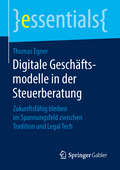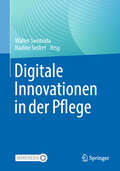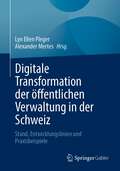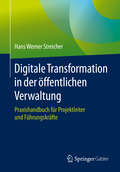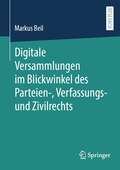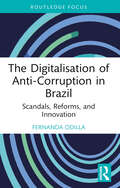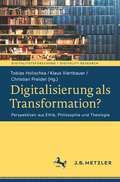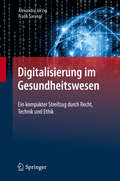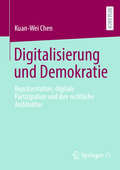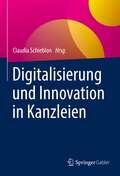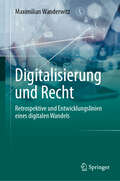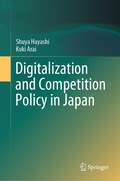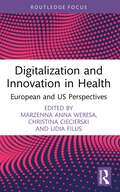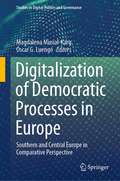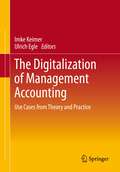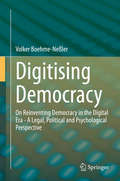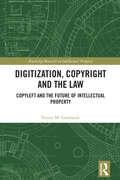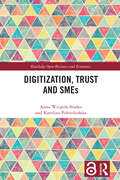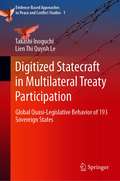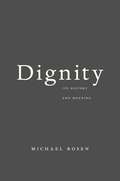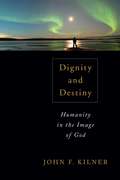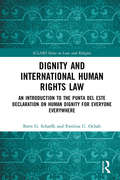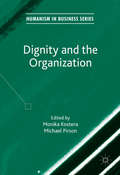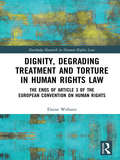- Table View
- List View
Digitale Geschäftsmodelle in der Steuerberatung: Zukunftsfähig bleiben im Spannungsfeld zwischen Tradition und Legal Tech (essentials)
by Thomas EgnerThomas Egner erläutert in diesem essential, dass veränderte Geschäftsmodelle in der Steuerberatung mit einem veränderten Leistungsspektrum sich nicht nur auf die Kanzleistrukturen und -prozessen auswirken, sondern vor allem auch sich verändernde Anforderungen an den Steuerberater und seine Mitarbeiter sowie neue Wettbewerbssituationen bedeuten. Der Autor analysiert den aktuellen Stand der Digitalisierung bezüglich einzelner Elemente des Beziehungsdreiecks zwischen Steuerberater, Mandant und Finanzverwaltung und gibt einen Überblick über die Erwartungen der Mandanten für die Zukunft hinsichtlich der Leistungen des Steuerberaters unter dem Einfluss der Digitalisierung. Ebenfalls betrachtet werden die zu erwartenden Entwicklungen auf Ebene der Finanzverwaltung.
Digitale Innovationen in der Pflege
by Walter Swoboda Nadine SeifertTechnische Unterstützung für kompetente Fürsorge und Pflege!Dieses Buch zeigt den aktuellen Stand digitaler Innovation in der Pflege und richtet sich an diejenigen, die sich mit ihr auseinandersetzten und die Entwicklung vorantreiben. Prozessmanagement und Prozessoptimierung werden durch digitale Systeme vereinfacht, zusätzlich können technische Lösungen Pflegefachpersonen entlasten. Das ist wichtig, um Ressourcen zu erhalten und Personal richtig einzusetzen. Ziel ist es, die Attraktivität des Pflegeberufs zu erhöhen und gleichzeitig eine hohe Qualität der Pflege sicherzustellen.Welche Angebote und Erfahrungen wurden bisher gemacht und wie werden Produkte erfolgreich eingeführt? Warum sind valide Daten Grundlage einer guten Pflege? Welche ethischen Anforderungen sind zu erfüllen? Zu diesen relevanten und sensiblen Themen bieten die Autoren wissenschaftliche fundiertes und praxisnahes Wissen.
Digitale Transformation der öffentlichen Verwaltung in der Schweiz: Stand, Entwicklungslinien und Praxisbeispiele
by Lyn Ellen Pleger Alexander MertesDas Buch zeichnet aktuelle Entwicklungen der digitalen Transformation in der Verwaltung im Schweizer Kontext nach. Thematisch setzen sich die Beiträge mit der digitalen Transformation im Hinblick auf die Ausgestaltung der Verwaltung, die demokratische Mitbestimmung, die digitale Leistungserbringung sowie mit regulatorischen Rahmenbedingungen auseinander. Verwaltungswissenschaftliche Theorien werden auf aktuelle Entwicklungen angewendet. Neben empirischen Studien werden Beispiele aus der Praxis vorgestellt und vor dem Hintergrund möglicher Herausforderungen, Chancen und Risiken diskutiert und verortet. Dieses Buch richtet sich an Interessierte aus den Bereichen Verwaltung, Politik und Wirtschaft, an Studentinnen und Studenten, Wissenschaftlerinnen und Wissenschaftler sowie Praktikerinnen und Praktiker. Dieses Buch erfordert kein spezifisches Vorwissen, sondern zielt darauf ab, eine möglichst breite Leserschaft an Interessierten zu informieren, weiterzubilden und zu unterhalten.
Digitale Transformation in der öffentlichen Verwaltung: Praxishandbuch für Projektleiter und Führungskräfte
by Hans Werner StreicherDieses Fachbuch zeigt Ihnen, wie Organisationen der öffentlichen Verwaltung den digitalen Wandel erfolgreich meisternBehörden und öffentliche Einrichtungen stehen vor der Herausforderung, ihre Leistungen und Aufgaben für Bürger und Unternehmen in elektronischer Form und unabhängig von Zeit und Ort zur Verfügung zu stellen. Für eine integrierte digitale Transformation des öffentlichen Sektors müssen alle internen Prozesse und Services hinterfragt und neu gedacht werden. Nur so ist eine Überwindung des weit verbreiteten und tief verwurzelten Bürokratiemodells möglich. Ausgehend von konkreten Umsetzungsbeispielen werden die Erfahrungen aus vielen Jahren intensiver Beschäftigung mit der digitalen Transformation in öffentlichen Verwaltungen beschrieben. Der Leser erhält zahlreiche methodische Vorschläge für die Herangehensweise in Projekten. Besonders betrachtet wird die Grundlagenarbeit in den ersten Phasen von Projekten, die vor einer Implementierung von neuen Anwendungen erledigt werden müssen, um maximal integrierte und digital transformierte Prozesse gestalten zu können. Zusammenfassend stellt Streicher zehn grundlegende Prinzipien der Transformation in der öffentlichen Verwaltung auf.Erhalten Sie zahlreiche anwendungsorientierte Hinweise und konkrete Lösungsvorschläge für erfolgreiche digitale Transformationen von Behördenverfahren und Services im öffentlichen SektorEs richtet sich an Führungskräfte und Projektleiter, die organisatorische und technische Veränderungen in ihren Organisationen planen und umsetzen. Die wichtigsten Punkte zum Inhalt sind:Geeignete Technologien für den Public SectorAusgewählte Projekte der digitalen TransformationStrategische Herausforderungen und Probleme in der PraxisWerkzeugkasten "Methoden und Formate“
Digitale Versammlungen im Blickwinkel des Parteien-, Verfassungs- und Zivilrechts
by Markus BeilMarkus Beil untersucht in diesem Buch die Zulässigkeit digitaler Versammlungen auf verschiedenen Ebenen. Einen Schwerpunkt bildet die Untersuchung, ob Parteitage sowie Aufstellungsversammlungen für Wahlbewerber digital durchgeführt werden könnten. Ebenfalls wird die Möglichkeit digitaler Bundestagssitzungen untersucht sowie die Zulässigkeit digitaler Sitzungen von kommunalen Vertretungsorganen. Zuletzt wird auf die Möglichkeit digitaler Gesellschafterversammlungen und die jüngst ergangenen Gesetzesänderungen eingegangen.
The Digitalisation of Anti-Corruption in Brazil: Scandals, Reforms, and Innovation (ISSN)
by Fernanda OdillaThis book investigates how digital technologies, such as social media and artificial intelligence, can contribute to combatting corruption in Brazil.Brazil, with its long history of scandals and abundant empirical data on digital media usage, serves as a perfect case study to trace the development of bottom-up and top-down digital anti-corruption technologies and their main features. This book highlights the connections between anti-corruption reforms and the rapid implementation of innovative solutions, primarily developed by tech-savvy public officials and citizens committed to anti-corruption efforts. The book draws on interviews with experts, activists and civil servants, as well as open-source materials and social media data to identify key actors, their practices, challenges and limitations of anti-corruption technologies. The result is a thorough analysis of the process of digitalisation of anti-corruption in Brazil, with a theoretical framework which can also be applied to other countries. The book introduces the concept of “integrity techies” to encompass social and political actors who develop and facilitate anti-corruption technologies, and discusses different outcomes and issues associated with digital innovation in anti-corruption.This book will be a key resource for students, researchers and practitioners interested in technologies and development in Brazil and Latin America, as well as corruption and anti-corruption studies more broadly.
Digitalisierung als Transformation?: Perspektiven aus Ethik, Philosophie und Theologie (Digitalitätsforschung / Digitality Research)
by Tobias Holischka Klaus Viertbauer Christian PreidelDigitalisierung ist zum Inbegriff geworden für den Übergang in eine neue Zeit mit neuen Möglichkeiten und Fragestellungen. Doch wofür steht ‚Digitalisierung‘ eigentlich jenseits der Computertechnologie und den damit verbundenen technischen Verfahren? Die Digitalisierung scheint einen Prozess mit weitreichenden Folgen für unsere Lebenswelt, für unser Denken, Handeln und Interagieren in Gang zu setzen. Neben diesen transformativen Bewegungen lassen sich dabei auch reduktive Tendenzen beobachten, wenn etwa soziale Interaktion zu technischer Kommunikation wird oder wenn die Grenzen zwischen Mensch und Maschine immer mehr verschwimmen. Der Band geht diesen Fragen nach und identifiziert Digitalisierung als einen wesentlichen Grund für den strukturellen Wandel der Gesellschaft. Dabei werden die philosophischen, ethischen und theologischen Dimensionen erörtert und darauf befragt, wo sich reduktive und/oder transformative Prozesse diagnostizieren und an ausgewählten Beispielen festmachen lassen.
Digitalisierung im Gesundheitswesen: Ein kompakter Streifzug durch Recht, Technik und Ethik
by Alexandra Jorzig Frank SarangiDas Buch sensibilisiert den Praktiker für die rechtlichen Risiken, die die Digitalisierung im Gesundheitswesen mit sich bringt und bietet Lösungsansätze. Datenautobahnen, künstliche (arztersetzende) Behandlungsintelligenz, Pflegerobotor, Health Apps, weltumrundete Onlinesprechstunden in Echtzeit und Blockchain sind als Begriffe in der Medizin nicht mehr wegzudenken. Mit einem Marktvolumen von 58,8 Mrd. US-Dollar im Jahr 2020 stellt die Digitale Revolution auch einen ganz erheblichen Markt mit Chancen für den Gesundheitssektor dar. Digitalisierung soll dem Patienten dienen. Sie soll Prozesse optimieren, effizienter gestalten und hat sich dabei am Datenschutz zu orientieren. Wer haftet für künstliche Intelligenz? Kann künstliche Intelligenz überhaupt versichert werden? Wie lernt künstliche Intelligenz? Und brauchen wir in Zukunft überhaupt noch menschliches Personal? Mit Fallbeispielen und Checklisten bietet das Buch eine Unterstützung für den Praktiker im Alltag.
Digitalisierung und Demokratie: Repräsentation, digitale Partizipation und ihre rechtliche Architektur
by Kuan-Wei ChenDas Buch untersucht die Beziehung zwischen Digitalisierung und Demokratie, wobei der Fokus auf der Rolle der Rechtsordnung liegt. Sie beleuchtet die Krise und den Wandel, die digitale Partizipation für die demokratische Repräsentation bedeuten, und analysiert systematisch die daraus resultierenden Veränderungen. Ausgehend von verschiedenen Demokratietheorien, darunter die repräsentative, plebiszitäre, partizipative und assoziative Demokratie, entwickelt die Autorin das Konzept der „digitalen Demokratie“, in dem Technologie als integraler Bestandteil der Demokratie betrachtet wird. Das Recht wird als zentrales Element zur Gestaltung dieser digitalen Demokratie verstanden. Die Arbeit schlägt wesentliche Strategien vor, um die Nachhaltigkeit der Demokratie in der digitalen Ära zu gewährleisten.
Digitalisierung und Innovation in Kanzleien
by Claudia SchieblonDie Arbeit in Wirtschaftskanzleien wird immer digitaler. Rechtsanwälte wie Mandanten schätzen die Erleichterungen durch neue Plattformen, Legal-Tech-Tools und künstliche Intelligenz, die die Arbeit in großen wie in kleinen Projekten unterstützen. Die Pandemie gab den Digitalisierungsprojekten in Kanzleien einen weiteren Schub. Alle Mitarbeiter der meisten Wirtschaftskanzleien arbeiten nun zeit- und ortsunabhängig. Neben der notwendigen Hard- und Software sorgen neue Systeme und Workflows für die reibungsfreie Arbeit. An der Schnittstelle zum Mandanten können eine Vielzahl von technischen Lösungen die Zusammenarbeit erleichtern und Legal-Tech-Tools im Projekt oder zur Geschäftsanbahnung eingesetzt werden. Digitalisierung geht Hand in Hand mit Innovation. Sie erfordert von einer Kanzlei ein Um- und Neudenken von tradierten Abläufen und die Weiterentwicklung der Kanzleikultur. Die Arbeit in interdisziplinären Teams und der Mut zu Veränderungen müssen entwickelt und ausprobiert werden. Das vorliegende Buch zeigt wichtige Aspekte von Digitalisierung und Innovation unterschiedlicher Wirtschaftskanzleien und belegt deren Innovationskraft auf dem Weg zur Kanzlei von morgen.Dieses Praxishandbuch ist geschrieben von Praktikern für Praktiker. Es bildet die vielfältigen Themen bei Digitalisierung und Innovation in Kanzleien ab - praxisnah und aus unterschiedlichen Blickwinkeln. Das Buch richtet sich an Managementverantwortliche aus Wirtschaftskanzleien (Anwalts-, Steuer- und multidisziplinäre Kanzleien) sowie Agenturen und Beratern von Kanzleien.
Digitalisierung und Recht: Retrospektive und Entwicklungslinien eines digitalen Wandels
by Maximilian WanderwitzDas Werk skizziert Entwicklungslinien eines digitalen Wandels, der Folge einer Verschränkung von Digitalisierung und Recht ist. Durch Retrospektiven, Beschreibungen gegenwärtiger Zustände und gelegentlichen Prognosen wird illustriert, wie sich diese Entwicklungslinien von der Vergangenheit bis in die Zukunft erstrecken. Besonders untersucht werden hierbei die Reaktionen des Rechts auf den digitalen Wandel, die Transformation des Rechts und rechtlicher Arbeit durch die Digitalisierung, die Rolle des Menschen als digital beeinflusstes und erfasstes Wesen sowie umfassende Transformationsprozesse, denen Verwaltung und Rechtsstaat unterworfen sind. Einen speziellen Schwerpunkt bilden daneben Aspekte zur Künstlichen Intelligenz: ihre Funktionsweise, ihre Risiken, ihre Regulierung sowie die Möglichkeit ihres Schutzes. In einen größeren Rahmen eingepasst wird dies alles durch die Erörterung rechtstheoretischer Problemstellungen, rechtsstaatlicher und verfassungsrechtlicher Fragen sowie gesellschaftspolitischer Aspekte. Zahlreiche praktische Beispiele, Grafiken und Übersichten runden das Werk ab
Digitalization and Competition Policy in Japan
by Shuya Hayashi Koki AraiThis book organizes the intent and purpose of the Japanese competition law (Antimonopoly Act) to address the digitalized socio-economy and provides a detailed explanation of its basic content as well as advanced issues. It includes an overview of Japanese law and its international position, a basic understanding of the big data and AI issues in today's competition law, and perspectives on high-tech regulation. In addition, it includes a variety of important topics, ranging from exploring principles to tackle digital regulatory realities, to understanding and analyzing the competitive realities of multisided markets. It also examines the relationship between information and competition law and that between consumer and competition law.Digitalization is a key concept in our economy and society today. Carbon neutrality initiatives, the need to improve productivity, globalization, and new ways of working are all seeking breakthroughs by way of digitalization. What’s more, digitalization requires free and fair competition in order to encourage technological innovation. The search for transparent and clear competition laws is essential to promote efficient and effective research and development and to promote public awareness through competition.
Digitalization and Innovation in Health: European and US Perspectives
by Weresa Anna Marzenna Christina Ciecierski Lidia FilusProviding a comparison between context in Europe and the US, this volume investigates the digital transformation of health systems, comparing strategies for digital development while identifying both key innovations and future challenges.The book covers a wide spectrum of topics, from explaining the nature of individual innovations to an analysis of demand-side and supply-side barriers, including funding issues and technological access. It also explores where digitalization is already playing an important role, for example, in clinical trials and disease modeling.Concluding with guidance for policy recommendations, this important book will interest students, scholars, and practitioners across health and social care, medicine, and beyond.
Digitalization of Democratic Processes in Europe: Southern and Central Europe in Comparative Perspective (Studies in Digital Politics and Governance)
by Magdalena Musiał-Karg Óscar G. LuengoThis book explores the digital transformations of democracy and democratic societies. It examines the various challenges posed by these transformations in the context of political practice and to theoreticians of democracy and political communication. The authors present studies from different countries, related to various effects of digitalization processes. Topics covered include, but are not limited to: Innovation in civil society research, new forms of civic participation, new dimensions of democratization and local governance processes, political changes and public participation, civic and political activities, political campaigning or other phenomenon driven by the implementation of information and communications technology (ICT) into politics. Therefore, the book is a must-read for all scholars and researchers of political science, practitioners, and policy-makers, interested in a better understanding of digital politics, digitalization processes, and democracy in general.
The Digitalization of Management Accounting: Use Cases from Theory and Practice
by Imke Keimer Ulrich EgleDigital transformation has companies firmly in its grip. Digitalization has a multidimensional impact on the mangagement accounting function and is changing mangagement accounting processes, controlling methods and the role of the mangagement accountant. This edited work shows how the opportunities of digitalization can be used in a way that adds value to the mangagement accounting function. The authors describe individual dimensions of digitalization in mangagement accounting and convey the necessary fundamentals and concepts. Use cases from controlling practice complement the theoretical foundations and show cross-industry approaches to solutions.
Digitising Democracy: On Reinventing Democracy in the Digital Era - A Legal, Political and Psychological Perspective
by Volker Boehme-NeßlerThis book argues that in the digital era, a reinvention of democracy is urgently necessary. It discusses the mounting evidence showing that digitalisation is pushing classical parliamentary democracy to its limits, offering examples such as how living in a filter bubble and debating with political bots is profoundly changing democratic communication, making it more emotional, hysterical even, and less rational. It also explores how classical democracy involves long, slow thinking and decision processes, which don’t fit to the ever-increasing speed of the digital world, and examines the technical developments some fear will lead to governance by algorithms.In the digitalised world, democracy no longer functions as it has in the past. This does not mean waving goodbye to democracy – instead we need to reinvent it. How this could work is the central theme of this book.
Digitization, Copyright and the Law: Copyleft and the Future of Intellectual Property (Routledge Research in Intellectual Property)
by Ettore M. LombardiThis book discusses copyleft and its impact on the traditional way to conceive of property. It is specifically focused on the European and international juridical framework.Analysing the impact of digitalization on copyright and the potential effect of copyleft in the European market and within a European and international juridical framework, this book explores the complex evolutionary framework which charts the reduction of physical property and the progressive expansion of intangible assets. Although digitalization enables more accessibility than ever before, this impacts traditional intellectual property frameworks. Evaluating common traits of ownership structure, the book considers the challenges that intangible property, open source and creative commons present to the current legal system. Examining the impact of copyleft on copyright and the law of ownership, the book considers the rights of authors and creators, legal limits and complications arising from these new forms of ownership of intangible assets. The book is grounded in the European potential regulatory framework of copyleft through movements like open-source software.The book will be of interest to students, academics and practitioners with an interest in contract law, property law and intellectual property law.
Digitization, Trust and SMEs (Routledge Open Business and Economics)
by Anna Wziątek-Staśko Karolina PobiedzińskaThis book exposes two inspiring research categories: digitization and trust. Digitization is a phenomenon that dynamically modifies the modern world in almost every area. Modern technologies, artificial intelligence and humanoid robots are instruments with an increasingly significant impact on the shape of the management process of modern organizations, including the way people are managed. Trust is a subtle concept, with a very different interpretation, influencing the behaviour of employees in a multifaceted way. A superficial look at the combination of both categories seems to see them as irrational. Upon closer examination, however, it exposes many interesting fields of scientific exploration. Trust, as a research category, has been included in three significant dimensions: in relation to co-workers, superiors and information technology, dominated by digitization. Each draws attention to different problems of priority importance for the organization. Asserting the idea that trust in the conditions of digitization becomes a category of timeless importance in the interdisciplinary dimension, this volume will be of interest to researchers, academics, practitioners and advanced students in the fields of management of technology and innovation, organizational studies and leadership.The Open Access version of this book, available at www.taylorfrancis.com, has been made available under a Creative Commons Attribution-Non Commercial-No Derivatives (CC-BY-NC-ND) 4.0 license.
Digitized Statecraft in Multilateral Treaty Participation: Global Quasi-Legislative Behavior of 193 Sovereign States (Evidence-Based Approaches to Peace and Conflict Studies #1)
by Takashi Inoguchi Lien Thi LeThis book is a rarity in that it opens a genuinely creative new vista for understanding global politics as distinguished from international politics, enhancing the vision for understanding global subjects such as multilateral treaties and the Covid-19 virus. Six hundred multilateral treaties deposited in the UN are conceptualized as a bundle of quasi-social contracts by sovereign states. A state’s participation in multilateral treaties is envisaged as digitized statecraft. Using a state’s physical actions and treaties’ attributes, 193 profiles of statecraft are analyzed with the implications for the future of global politics. This book demonstrates that multilateral treaties are both a vehicle and an agency in the globalization trend; thus, both state and international actors influence a state’s joining multilateral treaties. The book represents a marriage of international law and applied information science. It provides a framework for empirical modeling based on artificial intelligence and analyzes this framework in terms of international law and international relations. This book thus creates a new understanding of global politics.
Dignity: Its History and Meaning
by Michael RosenDignity plays a central role in current thinking about law and human rights, but there is sharp disagreement about its meaning. Combining conceptual precision with a broad historical background, Michael Rosen puts these controversies in context and offers a novel, constructive proposal. “Penetrating and sprightly…Rosen rightly emphasizes the centrality of Catholicism in the modern history of human dignity. His command of the history is impressive…Rosen is a wonderful guide to the recent German constitutional thinking about human dignity…[Rosen] is in general an urbane and witty companion, achieving his aim of accessibly written philosophy.” —Samuel Moyn, The Nation “[An] elegant, interesting and lucid exploration of the concept of dignity...Drawing on classical, liberal and Catholic traditions, Rosen hopes to rehabilitate dignity to its rightful place near the centre of moral thought...Rosen's admirable book deserves wide attention from political theorists, jurisprudes and political philosophers.” —Simon Blackburn, Times Higher Education “Dignity deserves to be widely read, not only for its intrinsic interest, but also as a corrective to the habit of discussing such topics in abstraction from their social context. Whether or not one agrees with Rosen's arguments, there can be no doubt he has widened our horizons.” —Rae Langton, Times Literary Supplement
Dignity: Its History and Meaning
by Michael RosenDignity plays a central role in current thinking about law and human rights, but there is sharp disagreement about its meaning. Combining conceptual precision with a broad historical background, Michael Rosen puts these controversies in context and offers a novel, constructive proposal.“Penetrating and sprightly…Rosen rightly emphasizes the centrality of Catholicism in the modern history of human dignity. His command of the history is impressive…Rosen is a wonderful guide to the recent German constitutional thinking about human dignity…[Rosen] is in general an urbane and witty companion, achieving his aim of accessibly written philosophy.”—Samuel Moyn, The Nation“[An] elegant, interesting and lucid exploration of the concept of dignity...Drawing on classical, liberal and Catholic traditions, Rosen hopes to rehabilitate dignity to its rightful place near the centre of moral thought...Rosen's admirable book deserves wide attention from political theorists, jurisprudes and political philosophers.”—Simon Blackburn, Times Higher Education“Dignity deserves to be widely read, not only for its intrinsic interest, but also as a corrective to the habit of discussing such topics in abstraction from their social context. Whether or not one agrees with Rosen's arguments, there can be no doubt he has widened our horizons.”—Rae Langton, Times Literary Supplement
Dignity and Destiny: Humanity in the Image of God
by John F. KilnerMisunderstandings about what it means for humans to be created in God's image have wreaked devastation throughout history -- for example, slavery in the U. S., genocide in Nazi Germany, and the demeaning of women everywhere.In Dignity and Destiny John Kilner explores what the Bible itself teaches about humanity being in God's image. He discusses in detail all of the biblical references to the image of God, interacts extensively with other work on the topic, and documents how misunderstandings of it have been so problematic.People made according to God's image, Kilner says, have a special connection with God and are intended to be a meaningful reflection of him. Because of sin, they don't actually reflect him very well, but Kilner shows why the popular idea that sin has damaged the image of God is mistaken. He also clarifies the biblical difference between being God's image (which Christ is) and being in God's image (which humans are). He explains how humanity's creation and renewal in God's image are central, respectively, to human dignity and destiny.Locating Christ at the center of what God's image means, Kilner charts a constructive way forward and reflects on the tremendously liberating impact that a sound understanding of the image of God can have in the world today.
Dignity and International Human Rights Law: An Introduction to the Punta del Este Declaration on Human Dignity for Everyone Everywhere (ICLARS Series on Law and Religion)
by Brett G. Scharffs Ewelina U. OchabThe Punta del Este Declaration, and this book dedicated to elaborating upon it, is devoted to exploring the ways that human dignity for everyone everywhere can be a useful tool in helping to address the challenges and strains facing human rights in the world today. In 2018, an initiative was instigated to revitalize the human rights project by way of engaging the notion of human dignity. This resulted in the Punta Del Este Declaration on Human Dignity for Everyone Everywhere (Punta Del Este Declaration), a declaration co-authored by over 30 human rights experts from all over the world. The Punta Del Este Declaration simplifies and brings coherence to the concept of human dignity in 10 brief statements that capture the many dimensions and aspects of human dignity and the practical ways that human dignity is useful in the promotion of human rights. This book provides an overview of how the notion of human dignity has been used to strengthen human rights. It discusses how human dignity playsmany different roles in human rights discourse and has the force to revitalize the human rights project; it is the foundational principle upon which the human rights project is built. But it is also the telos, or end goal, of human rights. At the same time, it is an important evaluative mechanism for assessing how well a country is doing in the implementation of human rights. The book will be a valuable resource for all those working in the areas of International Human Rights Law, Legal Philosophy, and Law and Religion.
Dignity and the Organization (Humanism in Business Series)
by Monika Kostera and Michael PirsonThis important book focuses on the role of human dignity, its protection and promotion in the context of organization and Humanistic Management. The recent phenomenon of humanism in management already has a rich body of literature and takes up many themes both theoretically, and from a practitioner perspective. Dignity and the Organization is the first book to explicitly deal with the topic of human dignity and management. The chapters address various aspects and problems from a humanistically-oriented perspective, taking up issues relevant for the contemporary management theorists and practitioners, and are concerned with organization, management and the social and cultural context. The book develops the notion of human dignity in conceptual and theoretical terms in its practical application, within the context of organizations.
Dignity, Degrading Treatment and Torture in Human Rights Law: The Ends of Article 3 of the European Convention on Human Rights (Routledge Research in Human Rights Law)
by Elaine WebsterAlthough scholars have shown longstanding interest in the boundaries of interpretation of the right not to be subjected to torture and other prohibited harm, the existing body of work does not sufficiently reflect the significance of the interpretive scope of degrading treatment. This book argues that the degrading treatment element of the right is a crucial site of analysis, in itself and for understanding the parameters of the right as a whole. It addresses how, methodologically, the scope of meaning and application of the right not to be subjected to degrading treatment should best be identified and considers the implications thereof. It systematically examines the diverse aspects of degrading treatment’s scope, from foundations of legal interpretation to the drivers of humiliation. It draws on wide-ranging literature and extensive analysis of more than 1,500 judgments of the European Court of Human Rights, which has pioneered the right’s interpretive growth. The book aims to explore how the interpretive possibilities, and limits, of the right not to be subjected to degrading treatment turn upon the axes of human dignity and state responsibility, and aims to show how this right’s protection can be achieved as well as limited through processes of interpretation. Dignity, Degrading Treatment and Torture in Human Rights Law provides interpreters with analytical tools to advance the application of the right not to be subjected to torture, cruel, inhuman or degrading treatment or punishment in international, regional and domestic human rights law. It will appeal to all who have an interest in understanding the right’s meaning, development, and potential scope of application, as well as those with an interest in methodologies of human rights interpretation.
